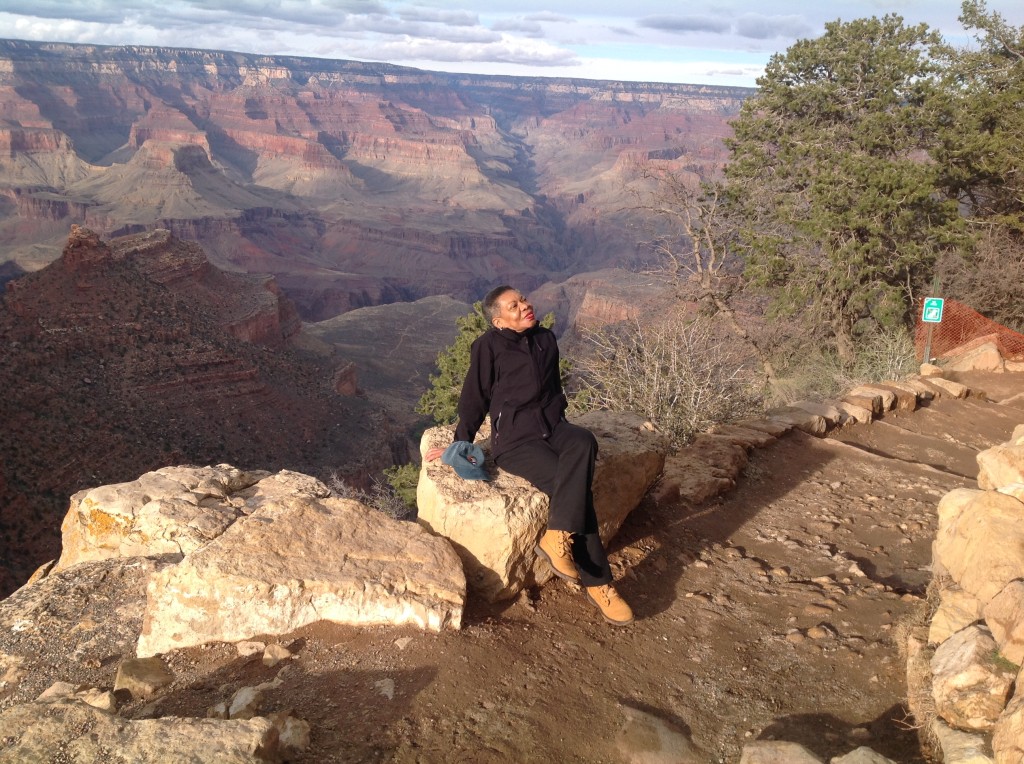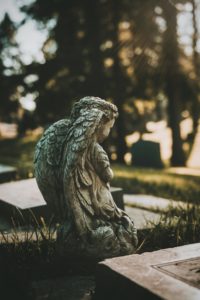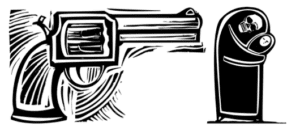While rarely front and center in media coverage of all things green, people of color are an essential and growing part of the environmental movement. Meet three people—a journalist, a scientist, and a leadership developer—who are leading the charge. All three are dedicated educators, passionate conservationists, and avid nature-lovers, and they want people of every color to experience both the deep joy and the great responsibility of stewarding God’s creation.
“The same God who made all of this made me, and as it is beautiful and perfect, I must be beautiful and perfect, too.”
– Audrey Peterman
 Audrey Peterman and her husband, Frank, are not your typical conservationists. Almost 20 years ago, they took a road trip around the country to “discover America” and stumbled upon the National Park System. In Grand Canyon, Yellowstone, and Yosemite, what stood out to them as much as the beauty and diversity of nature was the homogeneity of their fellow park visitors, virtually all of whom were white. Since then, the Petermans have worked tirelessly to promote the parks to Americans of color and to emphasize the opportunities for enjoyment and stewardship of these special places.
Audrey Peterman and her husband, Frank, are not your typical conservationists. Almost 20 years ago, they took a road trip around the country to “discover America” and stumbled upon the National Park System. In Grand Canyon, Yellowstone, and Yosemite, what stood out to them as much as the beauty and diversity of nature was the homogeneity of their fellow park visitors, virtually all of whom were white. Since then, the Petermans have worked tirelessly to promote the parks to Americans of color and to emphasize the opportunities for enjoyment and stewardship of these special places.
The Petermans shared their story in their 2009 book, Legacy on the Land: A Black Couple Discovers Our National Inheritance and Tells Why Every American Should Care, and more recently in Audrey’s 2012 travel guide, Our True Nature: Finding a Zest for Life in the National Park System! They are among the founders of Keeping It Wild, a nonprofit whose mission is to encourage African Americans to spend more time in nature.
The Petermans’ company, Earthwise Productions, helps organizations like the Environmental Defense Fund and agencies like the National Park Service connect with communities of color. Audrey Peterman serves on the board of the National Parks Conservation Association and is chair of the Diversity Committee of the National Parks Promotion Council. She has won several awards for her work, including the National Oceanic and Atmospheric Administration’s Environmental Hero Award in 2000. Learn more at LegacyontheLand.com.
What have your experiences in God’s creation meant to you?
Audrey Peterman: When I first laid eyes on Acadia National Park outside Bar Harbor, Maine, in 1995, I had a profound spiritual awakening. Driving into the park, I was mesmerized by the view of the dark green forest coming all the way down to the Atlantic, which lashed and thundered onto rocky shores. Gulls wheeled and called in a riotous cacophony as we drove up the steep, rock-faced Cadillac Mountain, climbing above the clouds, and finally emerging into a place of unearthly beauty such as I had never seen before. We were surrounded by a world so gorgeous and radiant it could hardly be believed. On one side, the sunlit ocean merged with the infinite sky. On the other side, the sun glinted on a dozen leafy offshore islands, turning the water into gold. Everywhere we looked were large swaths of blue and green.
At that moment I had the thought: “The same God who made all of this made me, and as it is beautiful and perfect, I must be beautiful and perfect, too.”
Since then I have seen myself as nothing but beautiful and perfect, and I see beauty and perfection in everything and in everyone I meet, because I know it to be an expression of God. When you have that personal experience of seeing God through his handiwork, life becomes a beautiful walk with him.
What do Christians most need to understand when it comes to care of God’s creation?
Peterman: The firmament has been here since the beginning of time. Humans are a very recent addition. Traveling through our National Parks gives me a relatively unique perspective on the long span of time and the effects that humans have on the planet. For example, in Bandelier National Monument in New Mexico, I climbed up into the caves inhabited by the descendants of Pueblo tribes that lived in the region 20,000 years ago, and I saw the minimal changes they made to the landscape. I slept 3,000 feet down in Grand Canyon National Park and met the descendants of Navajo people who’ve lived in the area more than 10,000 years, and I see how little they altered the natural world around them. I’ve slogged through the swamp in Everglades National Park and felt acutely how it was formed from the first drops of water spilling down from Lake Okeechobee 5,000 years ago, while the Pharaohs were still building pyramids in Egypt.
But today the Bandelier area is better known as the site of Los Alamos National Laboratory, where we developed the nuclear bomb. The Colorado River that carved the magical Grand Canyon has been dammed and diverted so much that it is a specter of its former self, unable even to make it to the Gulf of California, where it historically emptied and continued to the Pacific Ocean. The Everglades system has been ditched, diked, and overdeveloped, and those of us working to help restore it are seeing only glacially slow progress.
Europeans arrived on this continent only a little over five centuries ago, and today every river and stream in America is polluted; the air is polluted, and more densely so in poorer communities; our food is chemically engineered to bring us a higher burden of fertilizer, pesticides, and toxins; and drug companies glibly offer us a steady barrage of “medications” with side effects that include death.
So I think that what Christians most need to understand is the urgency of the issue. Caring for our planetary home is not something we can do later—it’s something we must do now, or we will knowingly be contributing to our own demise. The planet will survive long after we have fouled the environment so much that it is incapable of sustaining human life as we know it today. We are the ones who will pay.
If you could change one thing about the environmental movement in this country (or globally) what would it be?
Peterman: The environmental movement in this country has been kept deliberately, artificially white. In 19 years of doing this work you wouldn’t believe how many influential, no doubt well-meaning white people have said to me, “Those people [of color] have so many survival issues—how can we get them to care?” while completely ignoring the thousands of us who are doing this work valiantly with little financial or other support from the well-funded mainstream groups or agencies. Which makes me ask often, “How did the environment get to be in the hands of environmentalists?” Because you would think anyone who aspires to “save the earth” would have a real appreciation for people and the fact that no one group can do it alone. So what I’d most like to see is for the walls to come down and for there to be true integration of the movement and a sharing of power and resources, recognizing that we’re not going to be sustainable otherwise.
Who do you most desire to reach out to in your work and why?
Peterman: I am most interested in reaching out to Americans of African, Asian, and Hispanic descent, those people who are not traditionally seen as caring about the environment. The “environmental” knowledge base in these communities is relatively low, although they are mostly the people who historically have had a close relationship with the land and with nature. The new language has effectively socialized it out of them and placed them on the sidelines.
For example, I once asked my mother-in-law, “So, what do you think about environmentalists?” At the time we were just getting started doing this work and identified ourselves as environmentalists.
“Oh, chile,” she said dismissively. “That’s just people who want to get money from the government.”
“Really? But don’t you think we have to care for nature?” we asked in consternation.
“Well, nature, that’s something else. We have to take care of nature, because we can’t breathe concrete,” she said emphatically.
But apart from people of color, I look for allies everywhere—in the supermarket, at the gas station, on the train, in the media, in conservation circles, in churches and schools, in business and civic groups. I want to be entirely indiscriminate, because this is a life-and-death issue for the entire human race.
Meet Marcelo Bonto and Stefan Moss.


